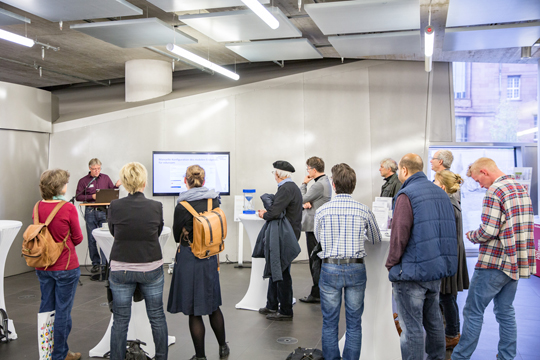Digestible Morsels of Knowledge
Freiburg, Oct 29, 2018
The University Library team is offering a new lecture format. Every Wednesday during lunch break, it will deliver a 15-minute knowledge snack over a cup of coffee. Among the items on the program are topics like “How do I get online? WLAN, eduroam & Co.,” “Rapacious Publishing – fake science und predatory journals,” and “Show your research résumé to the world with ORCID!”

Premiere: Rolf Hermkes’s talk on “How do I get on line? WLAN, eduroam & Co.“ opened the new lecture series at the Freiburg University Library. Photo: Jörg Blum/UB Media Center
A certain joyful anticipation can be sensed among library staff between the entryway and book drop in the run up to the 15-minute talks. In Winter Semester of 2018/2019 these will be held every Wednesday at one p.m. Venues will always alternate between the UB’s foyer, the foyer of the lecture hall of the Institute of Biology II/III, or the foyer of Building 101 of the Faculty of Engineering. “We’re all really excited,” says Dr. Ralf Ohlhoff, the head of the Department of Use and Information Services, as he introduces the talk by his colleague, Rolf Hermkes. The topic is really practical. Hermkes will explain, “How do I get online?”, meaning use WLAN at the UB.
Perhaps the subject explains why the age of those in the audience of thirty is somewhat greater than that the average student. Before they ever set foot in a library, most of today’s students are part of a generation that has long known how use WLAN to interconnect with the world. They would rarely need to be taught these basics. But that’s another thing that’s also special about this low-threshold informational event – it should appeal to all the UB’s users – including older people and guests from around the world. Yet nevertheless, accessing the UB’s network is still a top question of first semester students at the UB’s information desk. Further talk topics will be aimed at advanced and graduate students, so that all the UB’s users profit from the Coffee Lectures.
Promises kept
At first glance, you can see what the flyer promises is actually delivered. Guests receive cups of coffee, together with amarettini, just like in the picture. There is a large hourglass filled with blue sand on one of the bar tables. Ralf Ohlhoff turns it over at the start of his colleague’s talk. It takes exactly 15 minutes for the sand to run through it. Hermkes is finished providing his information just as the sand runs out. The applause at the end is for his perfect timing and a flying start to the program.
It’s likely that the crowds of UB staff will be smaller at later Coffee Lectures than they were at the premiere. But precisely these midday meetings also present an opportunity to speak to staff members about what an institution like the UB has to offer besides simply loaning out books.
Older students will remember relying on analogue research technology and endless hours spent poring over reference tomes. Today, all it takes is a single mouse click. The talks will give them a chance to go beyond nostalgic glorification to share the idea that snipe hunting through the most obscure of works was actually quite resistant to what are called “filter bubbles” today. Often, the side information picked up during the search was simply too interesting. This informative distraction has fallen somewhat out of fashion as today‘s search engines’ and social networks’ preferences for algorithms tend to cushion their users in news that merely confirms their personal world views.
Publishing and networking
The question of how reliable knowledge is in the online age is a priority for the lectures as well. That’s why the next talk will spotlight “Rapacious publishing – fake science and predatory journals.“ It’s vital for young researchers to know, for example, about the fraudulent publishing practices of some allegedly academic publishers. What use is it when your own publications appear quickly, yet fade into the obscurity of dubious journals despite a high fee paid for publication?
The next step, deciding how you would like to introduce your own research résumé to peers in your field around the globe, also requires careful consideration. In the third Coffee Lecture, the emphasis will be on introducing the globally established Non-Profit-Organization Open Researcher and Contributor ID, or ORCID for short. Participants will find how they can network internationally and best place their own publications in data banks and research environments.
Guests will get all this knowledge served up in small, concise bites – and topped off with a coffee in the mix. Ohlhoff and his team are very curious to see how this concept, that has already proven itself at other universities, will be accepted in Freiburg.
Jürgen Reuß
For more information (In German)

